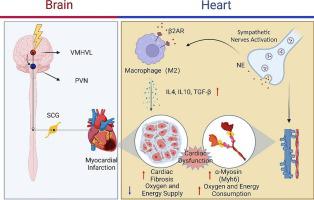Journal of Molecular and Cellular Cardiology ( IF 5 ) Pub Date : 2023-10-01 , DOI: 10.1016/j.yjmcc.2023.09.009 Zihan Liu 1 , Zhihao Liu 1 , Xiao Xu 1 , Yuyang Zhou 1 , Hu Chen 1 , Huixin Zhou 1 , Zeyan Li 1 , Fuding Guo 1 , Zhen Zhou 1 , Yuhong Wang 1 , Meng Wang 1 , Yueyi Wang 1 , Liping Zhou 1 , Hong Jiang 1 , Lilei Yu 1

|
Psychological stress has been recognized as a contributing factor to worsened prognosis in patients with cardiac failure following myocardial infarction (MI). Although the ventrolateral part of the ventromedial hypothalamus (VMHVL) has been implicated in emotional distress, its involvement in post-MI cardiac dysfunction remains largely unexplored. This study was designed to investigate the effect of the VMHVL activation in the MI rat model and its underlying mechanisms. Our findings demonstrate that activation of VMHVL neurons enhances the activity of the cardiac sympathetic nervous system through the paraventricular nucleus (PVN) and superior cervical ganglion (SCG). This activation leads to an elevation in catecholamine levels, which subsequently modulates myosin function and triggers the release of anti-inflammatory factors, to exacerbate the post-MI cardiac prognosis. The denervation of the superior cervical ganglion (SGN) effectively blocked the cardiac sympathetic effects induced by the VMHVL activation, and ameliorated the cardia fibrosis and dysfunction. Therefore, our study identified the role of the “VMHVL-PVN-SCG” sympathetic pathway in the post-MI heart, and proposed SGN as a promising strategy in mitigating cardiac prognosis in stressful rats.
中文翻译:

下丘脑腹内侧区在心肌梗死后交感神经系统心功能障碍中的作用
心理压力已被认为是导致心肌梗死(MI)后心力衰竭患者预后恶化的一个因素。尽管腹内侧下丘脑(VMHVL)的腹外侧部分与情绪困扰有关,但其与心肌梗死后心功能障碍的关系在很大程度上仍未被探索。本研究旨在探讨 VMHVL 激活对 MI 大鼠模型的影响及其潜在机制。我们的研究结果表明,VMHVL 神经元的激活通过室旁核 (PVN) 和颈上神经节(SCG) 增强心脏交感神经系统的活动。这种激活导致儿茶酚胺水平升高,随后调节肌球蛋白功能并触发抗炎因子的释放,从而加剧心肌梗死后的心脏预后。颈上神经节(SGN)的去神经有效阻断了VMHVL激活引起的心脏交感神经作用,改善了心脏纤维化和功能障碍。因此,我们的研究确定了“VMHVL-PVN-SCG”交感神经通路在 MI 后心脏中的作用,并提出 SGN 作为减轻应激大鼠心脏预后的有前途的策略。



























 京公网安备 11010802027423号
京公网安备 11010802027423号